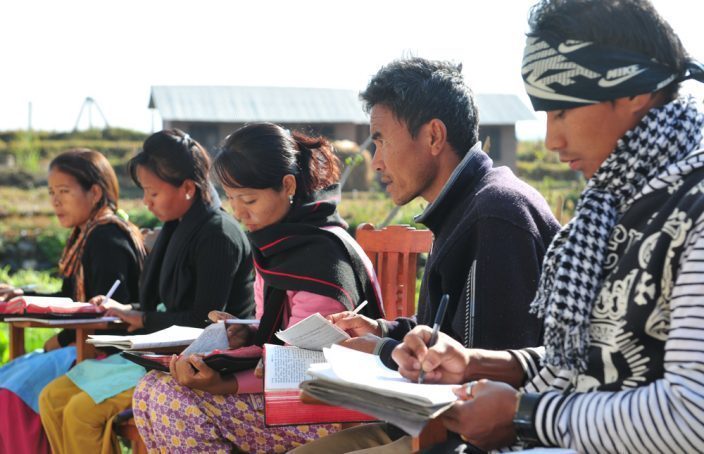
Sending Churches
How to Develop a Church Missions Strategy That Works
June 8, 2016
by Josh McQuaid

Your church probably doesn’t have a global missions strategy. And sadly, you aren’t alone.
The truth is that most churches don’t have a strategy for their global involvement. As a result, many simply aren’t engaged overseas. Those who are are more likely to answer a question about their strategy by telling you how big their “missions budget” is.
Whether your church gives $500 or $1 million per year to missions, the real question isn’t how much you’re giving, but how you’re giving it.
There are lots of ways to build a great global missions strategy. For now, I’d like to suggest five improvements to your church missions strategy that will increase your church’s global effectiveness.
Be intentional. And then, be intentional some more.
Success, in all areas of life, usually comes as the result of careful planning and hard work. When it comes to global missional engagement, many churches are simply carried along by whatever wave happens to pick them up. This leads to churches with little global engagement.
Though they may support half a dozen missionaries in half a dozen locations doing half a dozen different kinds of ministry, does the congregation know these workers? Does anyone have a connection to their ministry? Are the workers thriving in the ministry they were sent to accomplish?
All too often, a church’s global mission develops in isolation, away from the strategy and vision of the church. When an individual or a couple feels called to serve overseas, their calling is treated as something quasi-mystical and extremely private. It is rarely run through the grid of the church’s vision and focus.
Instead, wouldn’t it be better if we approached global missions in the same way we approach starting a youth group, worship team or local church plant? With intentionality, creativity, critical thought and careful planning? If we approach global missions strategy the same way, would we be more effective? We would certainly stand a better chance.
Global missions should be an outgrowth of local missions.
There is sometimes an unwritten assumption in churches that the development of global missions strategy should be left to the “experts,” and — so goes the thinking — the local church isn’t an “expert.”
I feel compelled to fight this series of beliefs. Yes, local churches are inherently more expert in their particular city or neighborhood, as they should be. But principles of missions are transferable, and I have found that local churches are remarkably adept at noticing when supposed “experts” have lost the plot.
In fact, global missions isn’t so different from local missions, and a great way to develop a global strategy that makes sense is to target ministries that fit what you’re already doing in your own city.
Let me give you some practical examples. I attend a church that has two very visible foci when it comes to local ministry: We minister to university students, and we minister to the homeless in our neighborhood. On both the local and global fronts, we support individuals who are working with college students, and we support individuals who work with the outcast, the underprivileged and the destitute.
Of course, the trick is often knowing how to turn these particular ministry venues into vibrant church planting ministries; that is where a missions agency can be a resource to you. But you probably don’t need anyone to tell you what kind of global ministry you should be involved in.
And, if your local vision isn’t big enough to support global missions, then, as I’ve argued in another post, your vision probably needs some expanding.
Geography matters very little.
We are very quick to define “missions” in terms of geography. In actual fact, geography is mostly incidental, as missions can happen anywhere.
Missions has much more to do with the act of engaging the un-gospeled, wherever we find them, with the good news of Christ’s kingdom. I encourage churches to build their strategies around mission type first and ministry location secondarily.
This approach not only encourages us to think of global missions as an outgrowth of local missions, but also positions churches to play to their strengths and giftings when it comes to global ministry.
Follow the relationships.
If you don’t have a global missions strategy, you’re very much in danger of paralysis by analysis, as there are too many good options to know where to begin.
If you just aren’t sure where to start, why not ask yourselves, “Where in the world do we already have a connection?”
Have you supported a handful of missionaries over the years? Start by looking at their ministries. Where do you have especially strong relationships? Who is doing ministry that resonates with your vision and mission?
You might also consider leading your congregation through an intentional season of prayer for the nations. As you do so, ask yourself these questions:
- Who does the Lord keep bringing to our minds?
- Do we gravitate toward any particular places or kinds of ministries?
- Who do we already know who is working in those kinds of ministries or places?
If you don’t know anyone who is already established in the ministries you would like to enter, ask around. Odds are, you’re not too far removed from someone who is doing a ministry in which your congregation would love to invest itself.
Choose depth over breadth.
Some churches approach their global strategy as if it were primarily about identifying all of the places where they won’t send people, even if they feel called there. This is not only the wrong attitude, but it misses the point altogether.
Having a church missions strategy is about sharpening your focus to increase your effectiveness, but it isn’t about closing off new opportunities. In fact, it’s worth considering having more than one target in your global strategy, just as you probably have more than one target in your local strategy (i.e., you probably don’t just reach out to youth, but also adults and retirees).
Too many targets can make it hard to maintain a unified strategy. Ideally, you want to have no more than a good handful of target ministries where you’re investing deeply, all of which clearly hook back to a central strategy that everyone in your church knows how to articulate. And if this global strategy is the logical partner to your local strategy, all the better.
For more content on how to be great sending church, check out this three-part series written by our partners at Upstream Collective.
Related articles

